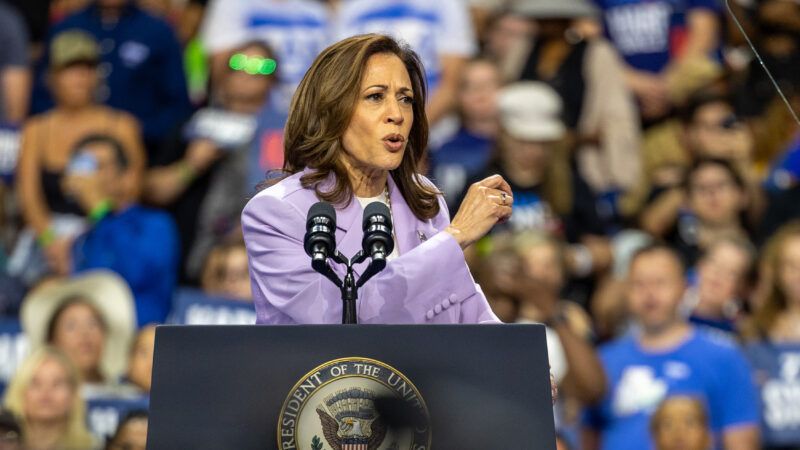60 Percent of Voters Want Kamala Harris To Abandon Bidenonomics
A new survey suggests that neither Harris nor Donald Trump have won over a majority of voters with their respective economic visions.

A new survey suggests that neither former President Donald Trump nor Vice President Kamala Harris has won over a majority of voters with their economic proposals. The results also suggest that most voters wish Harris would throw out her boss's policies altogether.
An August poll by the Financial Times and the University of Michigan's Ross School of Business gauged 1,001 registered voters' feelings about the top two presidential candidates and their respective handling of the economy in the next term. Of the respondents, 45 percent identified as or "leaned" Democrat, while 41 percent identified as or "leaned" Republican.
The Financial Times led its coverage by noting that Harris had notched a noticeable improvement over President Joe Biden. "More Americans trust Kamala Harris to handle the US economy than Donald Trump, according to a new poll that marks a sharp change in voter sentiment following President Joe Biden's withdrawal from the White House race," write Lauren Fedor and Eva Xiao.
Forty-one percent of surveyed voters prefer Trump as a steward of the economy, numbers identical to those captured in June and July and nearly unchanged since February. But 42 percent chose Harris, marking a distinct improvement over Biden, who only won over 35 percent of respondents in the July poll. (Biden withdrew from the race later that month.)
Notably, neither major party candidate got anywhere close to a majority, and 10 percent of respondents said they trusted neither candidate. The results also indicate that voters aren't even particularly confident in Harris's economic vision: 42 percent said that a Trump victory in November would leave them financially "better off," while only 33 percent said the same of Harris.
But perhaps the most jarring result is that six out of every 10 voters polled said Harris should scrap Bidenomics altogether, with 38 percent saying she should "take a completely different approach from Joe Biden's economic policies" and another 23 percent saying she should "make major changes."
"The poll is good news for previously-anxious Democrats, but their worries aren't over because voters still see themselves better off with Trump as president, and most voters think of their interests first and grand policy questions second," Erik Gordon, a professor at the University of Michigan's Ross School of Business, told the Financial Times.
No wonder: Consumer prices have gone up since Biden entered office in January 2021; in that time, the average family of four's monthly costs have gone up over $1,000, and mortgage rates are more than twice as high. Much of this owes to inflation, which despite cooling in recent months has dogged Biden for much of his presidency, reaching a 40-year high of 9.1 percent in July 2022.
While inflation is complex and its causes are multifaceted, government spending is a big driver, and in the first three years and five months of his term, Biden oversaw a $6 trillion increase to the debt held by the public, according to the Committee for a Responsible Federal Budget.
In fairness, it's not like Trump would be much better: In the same amount of time that Biden added $6 trillion to the publicly-held debt, Trump added $5.9 trillion. And the GOP's platform is full of measures like increasing tariffs and refusing to lay a glove on ballooning entitlements like Social Security and Medicare—policies that will only exacerbate inflation and push deficits further higher.
Still, Harris is unlikely to repudiate Biden's policies. "They've been aligned for the last three-and-a-half years. There's not been any daylight," White House Press Secretary Karine Jean-Pierre said on Monday, regarding potential policy differences between Biden and Harris. "She's going to build on the successes that they've had."
And yet Harris may be able to escape the stigma of Bidenomics unscathed: A Morning Consult poll conducted in late July—just days after Biden left the race—found that voters didn't blame the vice president for inflation to the same extent as they had blamed Biden, with Harris enjoying an 8-point advantage over her boss.
Just as polling suggests that Americans largely favor free trade, a similar portion of voters wish for Harris to jettison the current administration's inflationary economic policies for something different. Sadly, no matter which major party's candidate wins in November, it's unlikely that the U.S. will get its fiscal house in order anytime soon.


Show Comments (52)